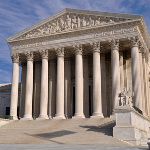These Two Decisions Highlight How Scalia’s Absence Has Affected the Court
 As the U.S. Supreme Court enters the last month of its term, the impact of having only eight justices already is clear. Some of the most high-profile cases of the year are not being decided, or perhaps even worse, are being resolved on narrow grounds that create more confusion than clarity in the law, writes Erwin Chemerinsky in the ABA Journal.
As the U.S. Supreme Court enters the last month of its term, the impact of having only eight justices already is clear. Some of the most high-profile cases of the year are not being decided, or perhaps even worse, are being resolved on narrow grounds that create more confusion than clarity in the law, writes Erwin Chemerinsky in the ABA Journal.
Chemerinsky is Dean and Distinguished Professor of Law at the University of California, Irvine School of Law.
“A 4-4 tie, which affirms the lower court without opinion by an evenly divided high court, is not a problem when there is no split among the lower courts and there already is a clear prior decision on point. In fact, in a couple of cases, the justices divided 4-4 on whether to overrule a precedent,” writes Chemerinsky.
He discusses Friedrichs v. California Teachers Association, which raised the issue of whether to overrule Abood v. Detroit Board of Education, which held that non-union members of a public employees’ union can be required to pay the share of the union dues that go to support the collective bargaining activities of the union. The article also considers Franchise Tax Board of California v. Hyatt, in which one of the questions presented was whether to overrule Nevada v. Hall, which held that a state may be sued in the courts of another state.




